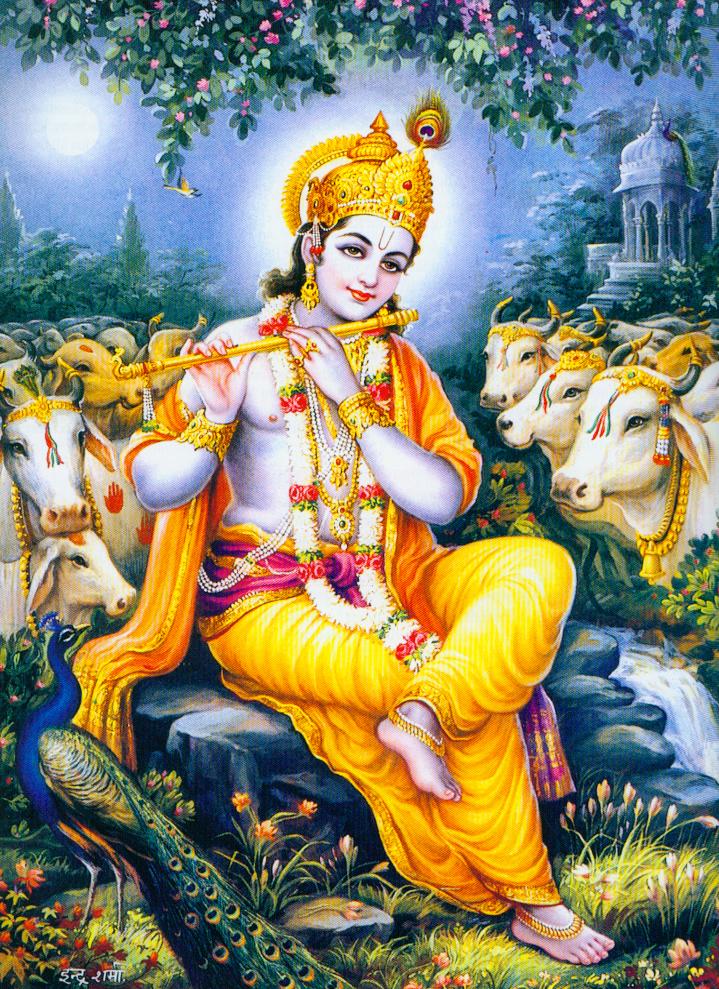Baha’i teachings encapsulate an expansive worldview that embraces the rich tapestry of human spiritual history. Within this framework, the figure of Krishna holds a particularly esteemed position, symbolizing a paradigm of divine guidance that transcends cultural and temporal boundaries. Delving into the significance of Krishna reveals insights that resonate with Baha’i principles of unity, love, and progressive revelation.
The narrative of Krishna, as recounted in ancient texts like the Mahabharata and the Bhagavad Gita, offers a profound exploration of duty, righteousness, and the complexities of the human experience. His life story serves as an allegory of the perpetual struggle between the material and the spiritual—a duality that many Baha’is recognize as integral to personal and communal growth. Krishna’s teachings emphasize the importance of aligning oneself with universal principles, urging individuals to transcend ego and embrace a higher purpose.
In the cosmic context of the Baha’i Faith, Krishna emerges as a significant figure within the continuum of divine messengers. He is seen as a manifestation of God’s wisdom, a precursor to subsequent revelations. This concept of progressive revelation is a cornerstone of Baha’i belief, highlighting that divine guidance is not static but rather evolves to meet the needs of humanity throughout different epochs. Krishna’s teachings, therefore, are not viewed in isolation; they’re part of an intricate mosaic that includes the teachings of Jesus, Muhammad, and Baha’u’llah, all of whom represent different, yet complementary, aspects of the same divine truth.
Krishna’s role in Hinduism is multifaceted—he is revered as a deity, a teacher, and a friend. Each of these roles holds profound implications for Baha’i followers. In acknowledging Krishna as a divine teacher, Baha’is recognize the importance of fostering love and compassion among humanity. His life exemplifies the virtues of detachment and devotion, urging adherents to cultivate a spirit of selflessness. By internalizing these principles, Baha’is endeavor to build a world illuminated by mutual respect and harmony.
The philosophical depth of Krishna’s teachings is particularly remarkable in the context of bhakti yoga, the path of devotion. This spiritual practice emphasizes an intimate relationship with the divine, fostering feelings of love and surrender. Baha’i teachings resonate with this devotional aspect, promoting a connection with God that is intimate yet inclusive, urging followers to embrace every individual as a reflection of the divine. This perspective cultivates a nurturing environment where differences are celebrated rather than suppressed, aligning with the Baha’i principle that emphasizes the oneness of humanity.
Moreover, Krishna’s profound discourses during the Kurukshetra War exemplify the moral dilemmas faced within the human experience. In the Bhagavad Gita, he articulates the intricate dance of duty, righteousness, and the law of the universe. This dialogue invites contemplation about the nature of justice, the responsibilities inherent in leadership, and the balances that must be struck in times of conflict. From a Baha’i viewpoint, these lessons transcend historical narratives, providing a framework for understanding contemporary issues of ethics and morality. The essence of Krishna’s discourse lies in the reminder that actions rooted in love and justice yield enduring consequences, thereby providing a moral compass that Baha’is aspire to follow.
As a pivotal character in Hindu theology, Krishna embodies the concept of divinity in action. His playful exploits, his interactions with the gopis, and his unyielding commitment to dharma serve as powerful metaphors for the Baha’i aspiration of establishing a world rooted in unity and compassion. Through the lens of Baha’i teachings, Krishna’s life can be interpreted as a clarion call for individuals to engage actively in the universe’s moral and spiritual evolution. This active engagement is mirrored in the Baha’i emphasis on service to humanity and the transformative power of knowledge.
The universality of Krishna’s message resonates profoundly with the Baha’i understanding of unity in diversity. His character traverses the boundaries of religion, culture, and societal norms, illustrating the shared human experience that connects us all. Each narrative thread woven into his story serves as an invitation for reflection—encouraging individuals to ponder their role in the greater cosmic tapestry. Through this reflection, Baha’is are inspired to contribute to the upliftment of society, responding to Krishna’s call to embody divine virtues in everyday life.
In essence, Krishna’s teachings illuminate the path toward self-discovery and divine connection. Baha’i principles, aligned with the wisdom of Krishna, affirm that spiritual evolution is both personal and communal—it thrives in environments where dialogue fosters understanding and where love supersedes antagonism. This shared ethos invites individuals from various backgrounds to collaborate in the quest for truth, forging alliances that transcend the limitations imposed by dogma or misunderstandings.
In conclusion, the interplay of Krishna’s life and teachings within the Baha’i perspective is a celebration of our shared spiritual lineage. It serves as a reminder that every sacred figure contributes to the grand narrative of humanity’s quest for truth. By embracing the insights gleaned from Krishna’s journey, Baha’is are encouraged to engage deeply with the complexities of existence, propelling themselves and their communities toward a future characterized by unity, justice, and unwavering love. Embracing Krishna as a pivotal figure illuminates the road ahead, marking the path as one of interconnection, shared wisdom, and divine inspiration.
